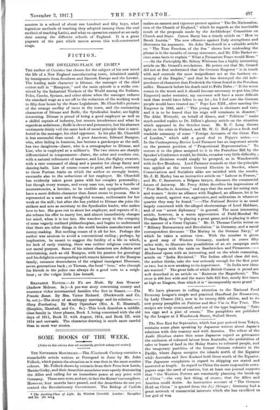SOME BOOKS OF THE NITIAAC [Notice in it column does
not nano:wily prellote seboeqnent rearm.] TOE NOvEMBER 310ETHLIES.—The Nineteenth Century contains a remarkable article written at Petrograd in June by Mr. John Pollock, which paints the situation as it was then in the moat sombre colours. Mr. Pollock shows by extracts from their Press how Lenin, Maxim Gorky, and their Anarchist associates were openly denouncing the Allies and calling for an immediate peace at any price with Germany. These men were, and are, in fact the Kaiser's accomplices. However, four months have passed, and the Anarchists do not yet control the Revolutionary Government. The Bishop of Carlisle • Ti.. Dwelling-Mace of Light. By Winston Churchill. London Macmillan
sod Co. 15.
makes an earnest and vigorous protest against" The De-Nationalise. tion of the Church of England," which he regards as the inevitable result of the proposals made by the Archbishops' Committee on Church and State. Canon Barry lies a timely article on " How to Break Austria." The new offensive against Italy strengthens anti illustrates his argument. Sir John Maeda:tell in a valuable article on " The True Freedom of the Sea " shows how misleading the phraeo is in the mouths of enemy statesmen, and Mr. Ellis Barker re- cites some facts to explain " What a Premature Peace would Mean." —In the Fortnightly Mr. Sidney Whitman has a highly interesting article on Mr. Gerard's revelations. He points out that Mr. Gerard did not at first understand that the German Emperor " is in touch with and controls the most insignificant act at the furthest ex- tremity of the Empire," and that he lies destroyed the old Mde- pendence of character that Frederick the Great found in the Potsdam miller. Bismarck before his death said to Felix Dalin ; " If the worst comes to the worst and it should become necessary to put him Rho Emperor] under restraint, my successor will have a more difficult task than would have fallen to my lot ; for I feel sure the German people would have trusted me." Pope Leo XIIL, after meeting the Emperor in 1888, said : " This young man is obstinate and vain, and it is to be feared that his reign will terminate in disaster." The Abbe Wetted., on behalf of Alsace, and " Politicos" make much-needed replies to Dr. Dillon'e gloomy article on the situation which appeared in the October issue. Mr. R. C. Long throws light on the crisis in Finland, and Mr. W. G. Boll gives a fresh and readable summary of some " Foreign Accounts of the Great Fire of London," which add a good deal to Pepys's notes.— In the Contemporary Review Lord Parmoor has on important article on the present position of " Proportional Representation." To restore it to the place assigned to it in the Franchise Bill by the Speaker's Conference would, he thinks, occasion very little difficulty ; borough divisions would simply be grouped, as in Wandsworth with its five Members. Lord Parmoor reminds us that the principle was applied at the recent General Election in Sweden, where Conservatives and Socialists alike are satisfied with the results. Mr. J. H. Harley has an instructive article on " Labour in France," and Mr. C. Smeesters, a Belgian lawyer, discusses the commercial future of Antwerp. Mr. Percy Alden describes his impressions of " Four Months in America," and says that the most far-seeing men and women " desire an alliance with England, an alliance, let it be clearly stated, against war, aggression, and militarism in whatever quarter they may be found."--The National Review is as usual largely concerned with the alleged shortcomings of Lord Haldane, and of our " secret diplomacy " in general. The most interesting article, however, is a warm appreciation of Field-Marshal Sir Douglas Haig, who "is playing a great game, and is playing it after the manner of a Great Captain." Mr. D. Thomas Curtin writes on " Military Bureaucracy and Revolution " in Germany, and a naval correspondent discusses " The Mutiny in the German Navy," of which he takes a serious view. With the number is given a good map of Western Germany, marked in zones fifty miles wide, to illustrate the possibilities of an air campaign such as has begun with the raids on SaarbrOcken and Pirmasone.— Blackwood opens with an interesting, and on the whole reassuring, article on "India Revisited." The Indian official class did not, the author thinks, take the war seriously enough for the first year or two, but is now awaking to its importance. "In India new ideas are wanted." The great falls of which British Guiana is proud are well described in an article on "Kaieteur the Magnificent." The river is 400 feet wide and the water falls 822 feet, nearly five times as high as Niagara, than which it is " incomparably more grand "














































 Previous page
Previous page